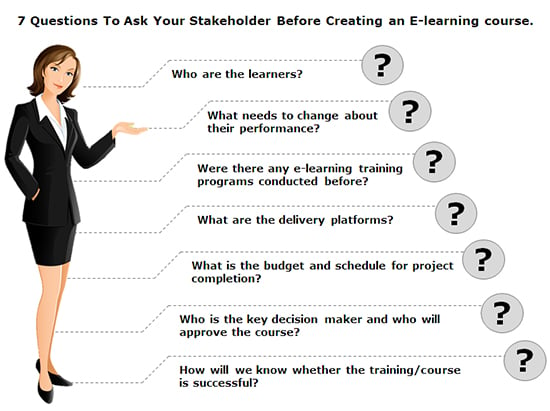7 Questions to Ask the Stakeholder Before Creating an Online Course

Last week, I was assigned a new e-learning project. As soon as I received this information, I was asked to have a call with the stakeholder, who was the training manager of an FMCG company. With little time to prepare, I went for the call and all hell broke loose!
After a while, it realized that the stakeholder wasn’t giving me any answers because I failed to ask him the right questions. So, I went back to my desk and made a list of questions to ask him and scheduled another call. Here’s what unfolded in the call…
My very first question was Who are the learners?
I know this sounds quite simple, but you will learn a lot about the people you’re creating the course for. In my case, I came to know that there are about 200-300 people belonging to the global procurement division of the company. I also came to know that they belong to the age group of 25 to 40.
I understood that it was a course directed at a global audience.
And, my target audience was young (an informal approach can be used for the course).
My next question was What needs to change about their performance?
In other words, what is the outcome of the course? The stakeholder seemed relieved to hear this question, and he went on and on for quite some time. When he finished answering this question, I had all the learning objectives and outcomes ready! The process was quite simple, and the stakeholder mentioned that he wanted to train the procurement division to use a new procurement tool to ensure hassle-free procurement and payment. So, I instinctively knew what the outcome of this e-learning course is.
My third question – Were any e-learning training programs conducted before?
This question helped me know whether my learners were novices or experienced with e-learning. If they were novice online learners, then the tone of the course needs to be a bit “introductory”, rather than just jumping into the subject matter. If your learners are well-versed with e-learning, then you can request your stakeholder to send one of their pervious courses so that you can create a course on the same lines. This won’t leave the learners confused, especially in terms of course navigation.
I then moved onto the technical bit – What are the delivery platforms?
This is a must ask question. It is the delivery platform that decides your authoring tool. For instance, my stakeholder wanted the course to be developed in Adobe Flash, but also needed mobile device and iPad compatibility as most of his learners use smart phones and tablets. Since the iPad does not support Flash, we came to a conclusion to go ahead with Articulate Storyline. This was a very important decision. Just imagine if we had created the course in Flash only to find out in the later stages that the course should be mobile compatible.
Next comes, What is the budget allocated for the project, and what is its timeline?
Although the budget is taken care by the project manager, it is important to know the cost of the project as it determines the effort you put into it. More than the budget, I was concerned with the project schedule. Deadlines decide the number of people working on the project. They also determine the iterations and review cycles of the course. The lesser the time the more the hassles in delivering the desired output.
Now to the most significant question – Who is the key decision maker and who will approve the course?
You need to make this point absolutely clear with your stakeholder. Many a time, we are told that the stakeholder is the decision-maker. Later only to be told later that his boss, or his boss’ boss saw the course and gave a few changes. ‘Finalizing’ the decision-maker right at the beginning will not only make your life easier, but also helps you judge the stakeholder expectations. It hard to meet expectations when you have no idea who gets to make the final call.
Last but not the least, How will we know whether the training/course is successful?
Most stakeholders tend to ignore this factor once the course is uploaded; you need to know if question number two (What needs to change about their performance?) has been answered. There are several ways to do so. You can track the learners’ progress and results on the LMS or conduct a survey to know whether the learners found the course useful or not. It is very important to assess the efficacy of the course. Feedback from the learners will help implement changes in next module. At the end of the day, the course is all about enhancing performance and bringing a visible change.

These seven questions helped me understand my stakeholder and his requirement and made my life much easier! What are the questions you ask your stakeholders? We’d love to know.




![Learning Analytics and its Role in eLearning Assessments [SlideShare]](https://blog.commlabindia.com/hubfs/Imported_Blog_Media/learning-analytics-elearning-assessments-role-slideshare.jpg)
